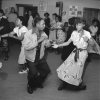Film
Six by Kurosawa
Curated by Ron Foley Macdonald, this brief, intense survey presents some key works by the legendary Japanese filmmaker Akira Kurosawa. From his early international breakthrough Rashomon to his monumental epic Ran, this series reveals Kurosawa's mastery of narrative and historical detail, and includes a selection of filsm inspired by western literary works, as well as those that inspired remakes by western filmmakers.
Screenings are every Wednesday at 12:30 pm and 8:00 pm in the Gallery.
7 March - Eastern Mirror, Western Echo
Lecture by Ron Foley Macdonald, 8:00pm in the Gallery
Liberally illustrated with film clips from keyworks, this lecture offers an exploration of Akira Kurosawa's position within the Japanese film milieu, his Western source material and further interpretations of his work.
14 March - Rashomon
Japan, 1950, 88 minutes, b & w
Winner of a Best Foreign Film Oscar, Rashomon tells the story of a rape and murder from several points-of-view, questioning the nature of truth, perception and experiences. It stars the great actor Toshiro Mifune as the bandit. This was also one of the first of Kurosawa's films to inspire an inferior early-60s remake, the William Shatner vehicle The Outrage.
21 March - The Seven Samurai (part one)
Japan, 1954, 104 minutes, b & w
Kurosawa brilliantly choreographs action sequences in this groundbreaking epic. Remade as The Magnificent Seven by Hollywood, the original Seven Samurai starkly portrays he medieval warrior code of Japan as seven unforgettable men defend a worthless village simply for the sense of honour and a bowl of rice.
28 March - The Seven Samurai (part two)
Japan, 1954, 104 minutes, b & w
4 April - The Hidden Fortress
Japan, 1958, 139 minutes, b & w
An autocratic princess and her deadpan general, accompanied by two bumbling misfits, journey homeward with the royal fortune with a minimum of help amidst many dangers. Sounds familiar? Acknowledged by George Lucas as the main inspiration for Star Wars, The Hidden Fortress was one of Kurosawa's personal favourites.
11 April - Throne of Blood
Japan, 1957, 108 minutes
T.S. Eliot's favourite film was Kurosawa's adaptation of Shakespeare's Macbeth, titled Throne of Blood. With Mifune in the central role of the amibtious aristocrat who ruthlessly pursues the crown, Kurosawa neatly moves the plot to Samurai-era Japan.
18 April - Yojimbo
Japan, 1961, 110 minutes, b & w
A superb tongue-in-cheek Samurai tale of a lone warrior playing off two warring factions of a remote town, Yojimbo mixes comedy and drama into a seamless whole. Starring Mifune in one of his greatest roles, this film was remade by Sergio Leone as A Fistful of Dollars - which itself began the cycle of "spaghetti westerns". Yojimbo clearly shows the influence of John Ford and was based on Dashiell Hammett's hard-boiled novel Red Harvest, thus completing the circle of west influencing east and east influencing west.
25 April - Ran
Japan/France, 1985, 161 minutes, colour
Ran could simply be described as Shakespeare's King Lear, transposed to medieval Japan with sons instead of daughters. However, it is much more: stately and visually formal, it is Kurosawa's tribute to his contemporaries Ozu and Mizoguchi and his farewell to the Samurai traditions he so favoured throughout his career. Winner of an Oscar for costume design, Ran is a visually ravishing tale of ambition, power and humanity on the grandest of scales.




